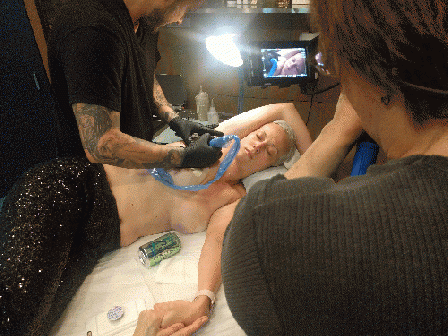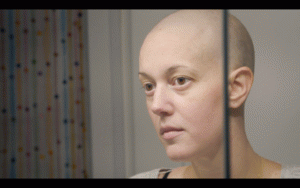My guest today is Rachel Pikelny, a Chicago-based, award-winning filmmaker and current Director of Production at Siskel/Jacobs Productions.
Joan Brunwasser: Welcome to OpEdNews, Rachel. I saw Grace, your latest film, at a Northwestern University event. Can you get the ball rolling and tell our readers a bit about the film?
Rachel Pikelny: I've been producing films for several years and have always wanted to direct my own project, but I was waiting for the right topic to come along. Late summer in 2016, I was coming back from a conference in Los Angeles and was catching up on the news while waiting for my flight. I came across an article in the Chicago Tribune about this tattoo artist, David Allen, who was helping women heal after they'd survived breast cancer by designing these gorgeous, floral images over their mastectomy scars. The story immediately caught my attention, as I'd recently finished treatment for breast cancer. I met David and he ultimately introduced me to Grace Lombardo, a 36-year-old mother who was on his schedule to be tattooed the following spring. I started filming with her and continued over the next six months.
The film is a short, about 16 minutes, and it tells the survivor's story - one that begins after the last day of treatment. After everyone else thinks "it's over," another battle is actually beginning: learning to live as a survivor, with all the physical and emotional changes that come along with it.
JB: Making this film must have been extraordinarily challenging for you, since you are also a recent breast cancer survivor - or do you prefer a different characterization? It would be hard to think of a more personal subject. Did you have mixed feelings about taking on this project? Talk to us about that, please.
RP: I never intended to make a film about breast cancer, nor did I want to make a film about myself. But some projects you choose, and others choose you. I think this project made me make it, and I'm so grateful for that. Before embarking on this film, I wasn't terribly open about my own experience with breast cancer. I was so focused on getting back to normal that I never fully explored internally, and voiced openly, the struggle and its aftermath. As I began interviewing Grace, the subject of the film, and eventually, building a friendship with her that extended off-camera, I found that there really is no "getting back to normal." It's a new identity and a new truth that I'm still navigating, but it's undeniable.
I found this particular filmmaking process incredibly personal and difficult at times, and also hugely therapeutic. By the time my editor Katie Wrobel and I began cutting the film, I was thinking critically not only about Grace's story and my own, but also the universal experience of a breast cancer survivor. I really hope it resonates with many women out there.
JB: This project clearly chose you. And it changed you, too. After seeing the film, I was surprised to learn that the impetus for it was an article about the tattoo artist. Yet, you chose Grace to be the focus of the film, rather than David, the artist. How did that come about, why and at what point in the filmmaking did you tweak that focus?
RP: You're right. At first, I did think David would be like the hub of a wheel, with the spokes being the stories of a few women who come to him for a tattoo. But after I met Grace, I realized that she was a strong enough subject to carry the entire film. I also wanted to, in a way, honor my own experience as a survivor, something that I knew much more about than being a tattoo artist! And I wanted the film itself to echo their relationship - with David being a vessel for Grace's healing process.

Dana Kupper (Director of Photography) filming Grace being tattooed by David at Pioneer Tattoo, Chicago; May, 2017
(Image by courtesy of Rachel Pikelny) Details DMCA
David is a fascinating, talented tattooer with a very specific skill-set and a massive clientele. He has a queue of about 2,000 women and can't serve them all, so he's training others to do the work. He's weeks away from opening up his own shop and plans to offer a certification class to tattooers and medical professionals from all over the world. He'll teach both the process of tattooing scar tissue (which reacts to the needle differently from unscarred, non-radiated skin) and also the art of empathy during the process.
JB: I am fascinated! How did David get started with this in the first place? Clearly, it's not the usual trajectory that tattoo artists take. Did the article you read talk about this?
RP: The Chicago Tribune article touched on this, and I've spoken with David about it as well...
As I understand it, David has practiced in various media over the years, serving as the creative director for a magazine for few years, painting (which he still does), and then tattooing. About eight years ago, a woman contacted him about getting a tattoo over her mastectomy scars. She had recently survived breast cancer and thought it would help not only cover the scars, but also help her heal emotionally. At first David was resistant, but the woman contacted him over and over until he agreed to do it. I think the experience was very draining and challenging for him in some unexpected ways; he's an empathetic person by nature, and he truly felt the weight of it. He didn't do more mastectomy tattoos for a while after that. Well, that woman agreed to have David post photos of her tattoo on Instagram alongside his other work, and as it slowly began to gain attention, more and more breast cancer survivors began contacting him. He realized that he had a gift to give to the world and now feels it's a responsibility to use that gift for good. Today, he does about 1-2 mastectomy tattoos per week, in addition to his other tattooing work.
(Note: You can view every article as one long page if you sign up as an Advocate Member, or higher).







